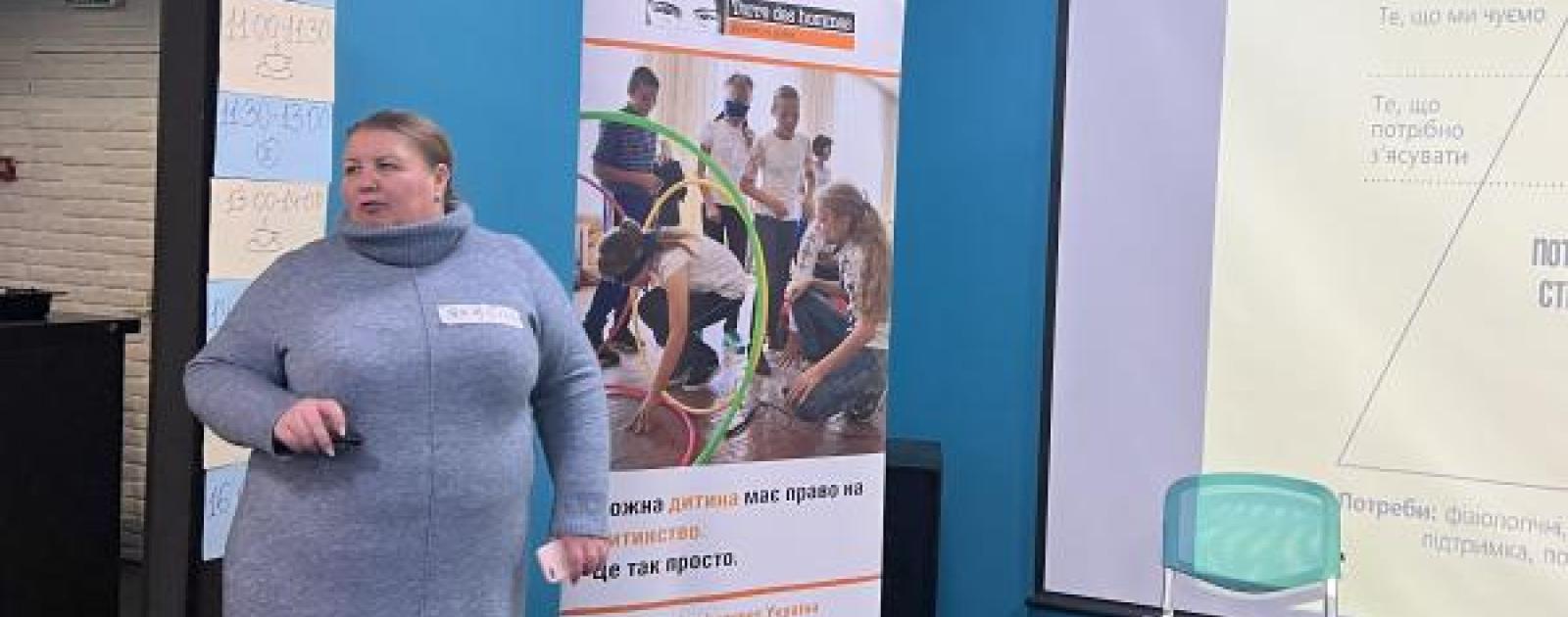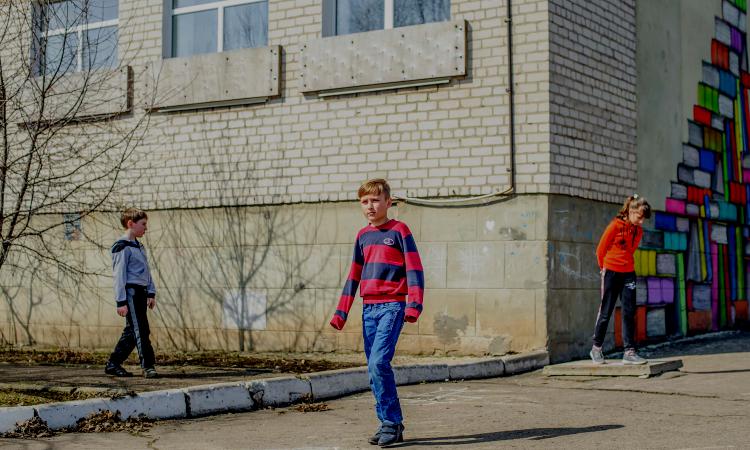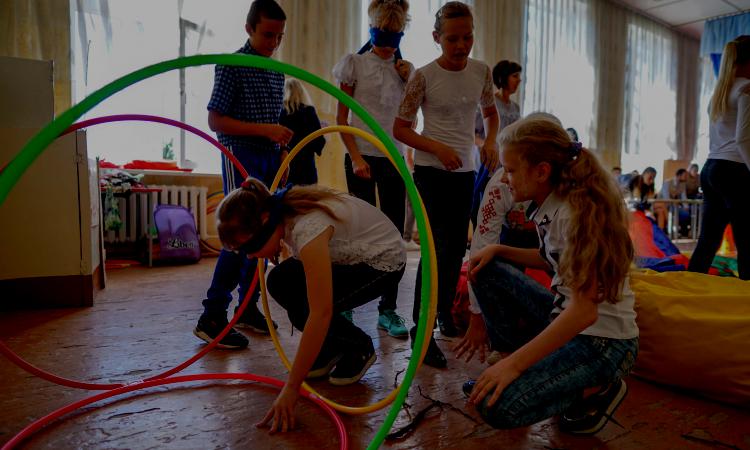
Non-violent communication (NVC) is the idea that we are all inherently capable of compassion. People who practice NVC manage to achieve more sincerity, deeper understanding and sincerity in communication. They are also able to resolve conflicts more constructively.
The basis of this method is understanding yourself and others through clarifying facts, observations, feelings, and needs.
That is why teaching the method of non-violent communication is an important component of Terre des hommes trainings. As part of the project "Preparing Schools for Social Cohesion," we conducted training for teachers from 33 schools in Kharkiv, Sumy, Chernihiv, Dnipro, Zaporizhzhia, Mykolaiv, and Odesa regions.
We talked to Anzhela Starovoitova, a trainer in nonviolent communication, about the training and this exciting method.
Good afternoon, Angela! Please tell us how you learned about nonviolent communication?
How do I know this method? I think I've known it since birth. I believe that we all know from childhood how to behave without violence. This method lives in us. From the moment we are born, we understand how to take care of our needs better than we do now. For example, a baby is hungry and screams. And everyone around him starts running around to satisfy his needs. You see, it knows what to do to get what it wants. This is the basic principle of the method: to feel your needs and communicate them to others.
So "nonviolent communication" is not about the rules of communication, but rather about understanding yourself? And how do you communicate your needs correctly?
There is no such thing as the right way to communicate. You have to do it sincerely. The way I feel. When someone tries to use this method as a manipulation, it looks unnatural and ridiculous. You can't just speak with wording from a book and template phrases. This method has to become a part of life. I continue to research this topic, but I already see that people respond to sincerity with sincerity. Therefore, NVC is about being real here and now. Taking care of yourself and not harming other people.
But still, there are formulations that are better to convey your message?
Of course there are. But they consist of voicing your feelings and needs. Let me give you an example. My first education was in simultaneous interpretation from a foreign language. I was taught how to help one person hear another. Through words. That is, my task was to translate the thoughts of one person so that the other would understand what was meant. For me, nonviolent communication is also a translation. For example, someone will say: you have offended me. I translate: he is trying to tell you that he is now very hurt by what he has heard.
This all sounds like a philosophy of life that needs to be comprehended over many years. And it's hard to believe that you can learn this kind of communication at a training in a few days. So what is it?
The method of nonviolent communication is called the "language of life". It was founded by American psychologist Marshall Rosenberg in the 1960s. He developed a model of communication that can help you transform your relationships with people around you and find understanding with yourself. We can say that this is an algorithm that helps us speak in a way that not only makes us heard, but also listened to. Indeed, it is difficult to teach this in a few days. But we can tell people that it exists. And give them the basic tools to master NVC.
For example?
For example, we give people names for their feelings. Understanding your feelings is not as easy as it seems. Anger can hide disappointment or even fatigue. And when we realize what exactly is happening to us, we can ask for help. To learn how to do this, we should ask ourselves simple questions more often: What am I feeling right now? What is the need that my feelings are communicating? Do I want to share it? If I understand what is happening to me right now, I know what to do about it and how to solve it. Likewise, when I know and hear the needs of another person, it is easier for me to understand them and build connections.
It's clear in theory, but how to use it in practice?
Where to start. I'll tell you about an exercise from our trainings that, judging by the feedback, is my favorite. This is a mediation exercise. I use it to better understand the needs of another person. When a person says something to me that I don't like, I give it back to them the way I heard it. That is: "I heard it like this (I say how I heard it), did you mean it? Is this important to you? Is that why you are telling me this?" If I misunderstood, the person will rephrase. And so it will be easier for us to understand each other. The goal of this exercise is to return the meaning. Paraphrasing or mirroring. Instead of overthinking and getting angry at the person who said something we didn't like, we give them the opportunity to express their opinion and hear it.
Where would you recommend studying this method?
Of course, from Marshall Rosenberg's book The Language of Life. And also from the realization that NCS is not a method, but first of all a worldview that improves the quality of life. During the trainings, we teach how to talk about your feelings and needs, how to distinguish facts from judgments, how to speak facts and not cause unpleasant emotions in others. But the most important indicator of success for me is when a person says after the training: I have learned to take care of myself. Because only when we are in harmony with ourselves can we build relationships rather than conflict.
Do you mean that a person is able to master this method and not experience negative feelings?
Not at all! Is there anyone I hate? I think so. My philosophy is not about not experiencing unpleasant feelings. My philosophy is to look for their cause within myself. Because this hatred is mine, it lives in me. If I do not work with it, I will have internal illnesses. So I have to ask myself the question: why do I hate this person? Behind every person's actions and feelings is some unmet need. Identifying and satisfying it is self-care.
The training program on nonviolent communication is held in the format of cascade trainings - experienced Tdh trainers have trained school teachers and psychologists, and they, in turn, train colleagues from their own and other schools. In addition, in February, the schools hold classes on IPV for parents. In today's environment, effective communication and conflict resolution skills are of vital importance. That is why we support the desire to share this knowledge!
The project "Preparing Schools for Social Cohesion" is implemented by the Terre des Hommes Foundation in Ukraine with the support of the EU4ResilientRegions - Special Assistance to Ukraine project, implemented by the German Federal Company Deutsche Gesellschaft für Internationale Zusammenarbeit (GIZ) GmbH on behalf of the German Government.

